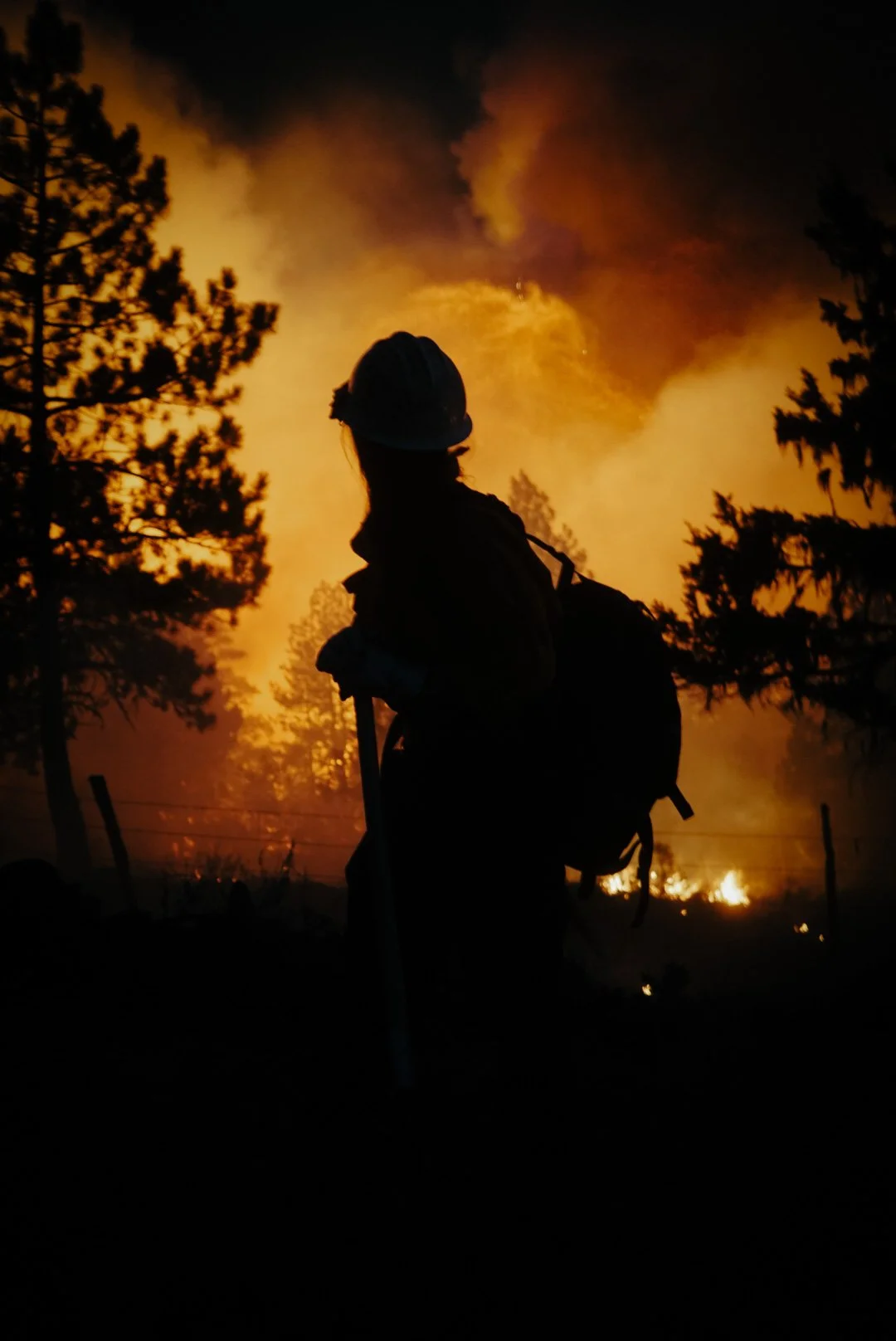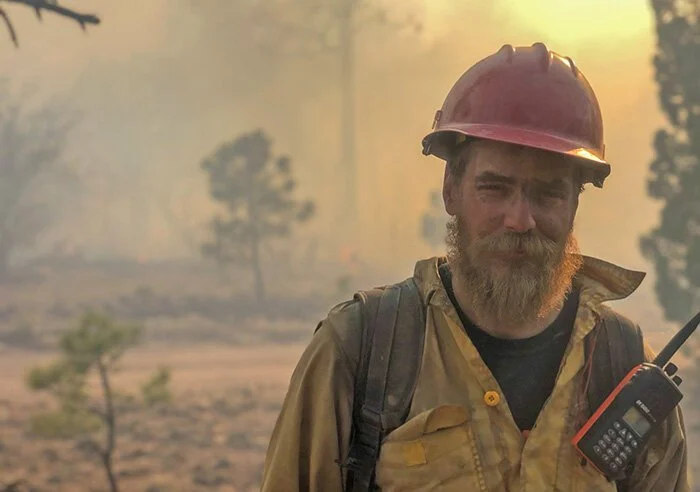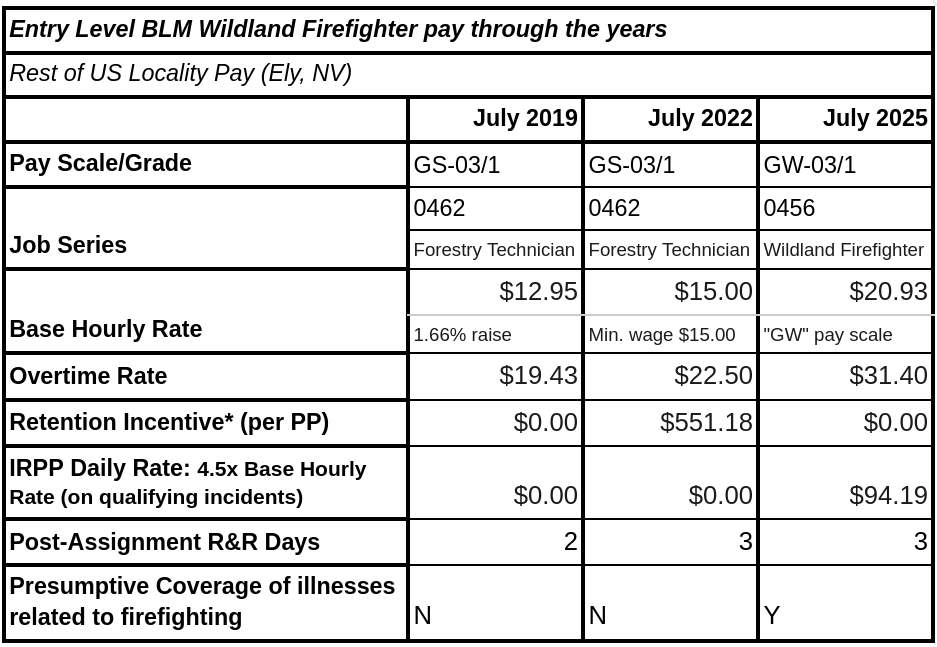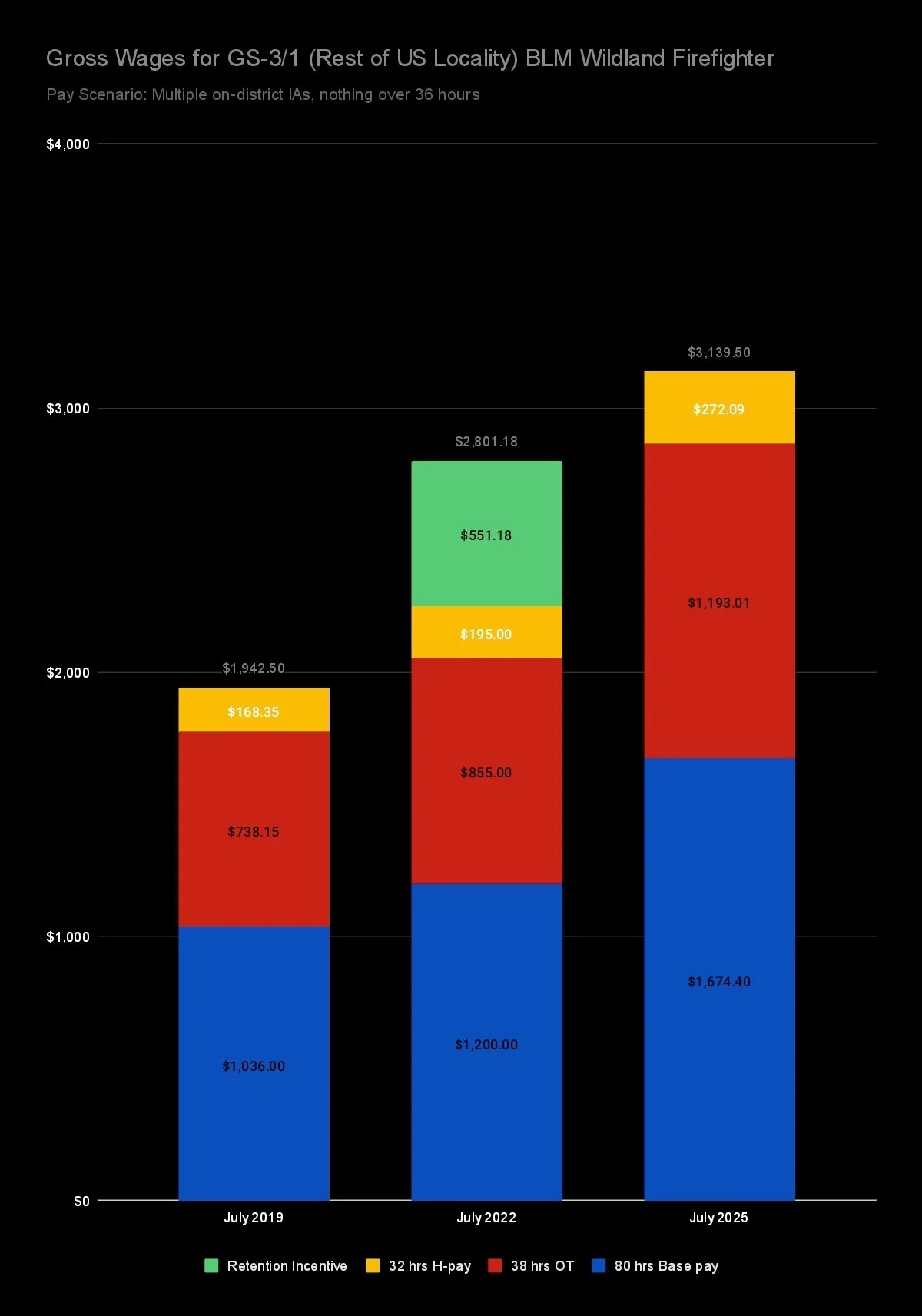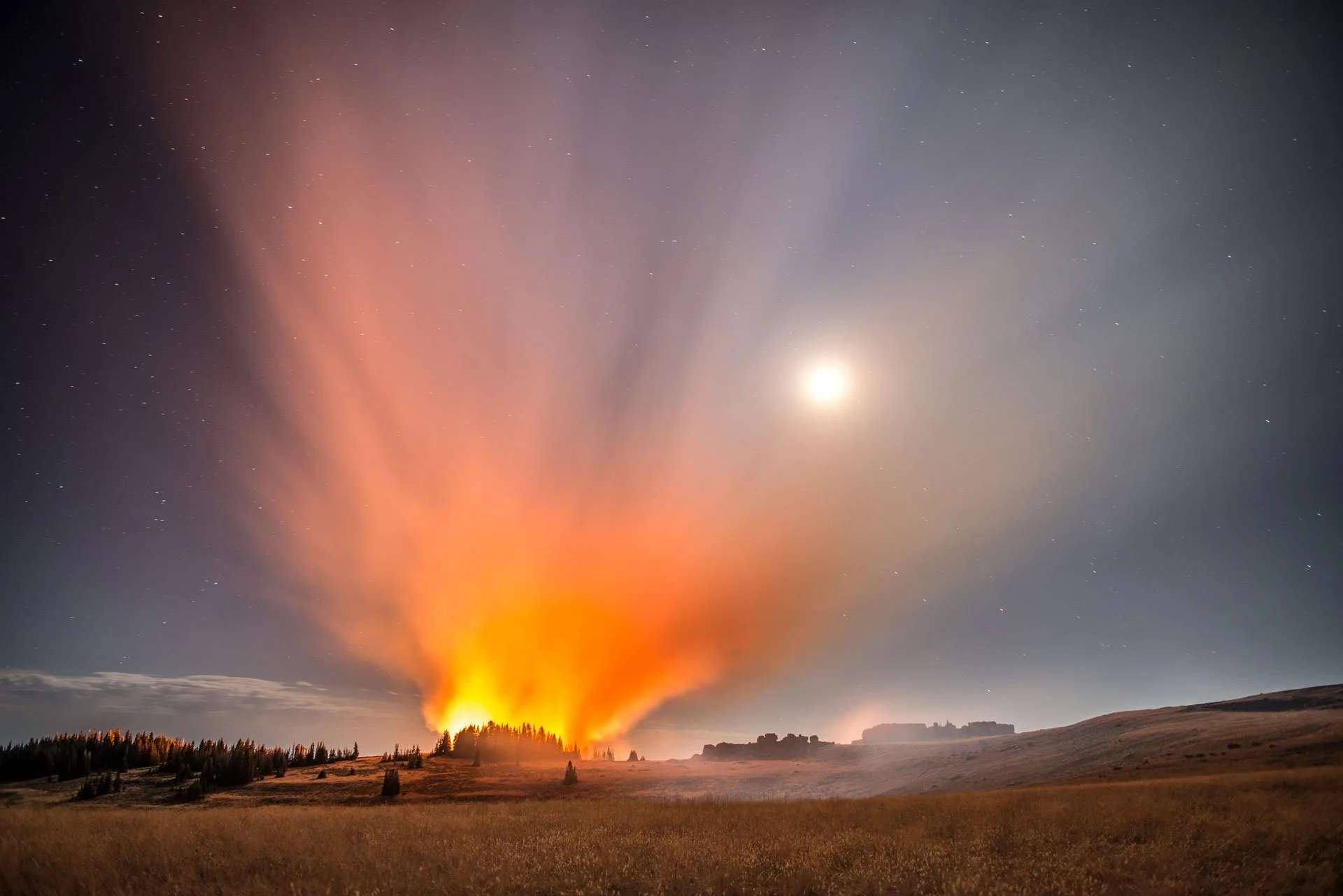
Current Legislative Efforts
Bills We Champion
Grassroots Wildland Firefighters advocates for and has supported the following legislation that addresses wildland firefighter rights and protections.
2025 Update: Major components of WFPPA have been passed in the Full-Year Continuing Appropriations and Extensions Act, 2025 (H.R. 1968).
Wildland Firefighter Paycheck Protection Act (S.2272)
The passage of Tim’s Act is our ideal scenario. It is common sense policy drafted with the intent of facilitating the lived experience that federal wildland firefighters and their families deserve, through legislation.
Tim’s Act HR.3108 & S.1505
Wildland Firefighter Paycheck Protection Act
(S.2272)
Legislation to improve overall compensation for federal wildland firefighters
What’s Changing?
Creating a new pay table, separate from the GS table.
Create new “Incident Response Premium Pay”, 450% of base pay rate daily, after 36 hours for all employees engaged in wildland firefighting
Create Rest and Recuperation Pay for recovering after a wildfire incident
-
GS-1 42%
GS-2 39%
GS-3 36%
GS-4 33%
GS-5 30%
GS-6 27%
GS-7 24%
GS-8 21%
GS-9 18%
GS-10 15%
GS-11 12%
GS-12 9%
GS-13 6%
GS-14 3%
GS-15 1.5%
-
There are a lot of qualifiers.
First, your personnel have to qualify:
A covered employee means an employee of the US Forest Service or Department of the Interior who—
(A) Qualifies as a wildland firefighter based on the definitions of ‘firefighter’ and ‘wildland firefighter’ in section 5332a(a); or
(B) is certified by the applicable agency to perform wildland fire incident related duties during the period such employee is assigned to a qualifying incident;
Second, your event has to qualify:
The term ‘qualifying incident’ means a wildfire incident, a prescribed fire incident, or a severity incident, but excludes an initial response incident that is contained within 36 hours.
Definitions:
‘Wildfire Incident’ means a wildland fire originating from an unplanned ignition, such as lightning, volcanos, unauthorized or accidental human-caused wildfires, and prescribed fires that are declared wildfires.
‘Prescribed Fire Incident’ means a wildland fire originating from a planned ignition in accordance with applicable laws, policies, and regulations to meet specific objectives;
‘Severity Incident’ means an incident in which a covered employee is pre-positioned in an area where conditions indicate there is a high risk of wildfires;
Lastly, your qualified personnel have to meet these criteria:
“(b) Eligibility.—A covered employee is eligible for incident response premium pay under this section if—
“(1) the covered employee is deployed to respond to a qualifying incident; and
“(2) the deployment described in paragraph (1) is—
“(A) outside of the official duty station of the covered employee; or
“(B) within the official duty station of the covered employee and the covered employee is assigned to an incident-adjacent fire camp or other designated field location.
If all that is met, then:
“(2) COMPUTATION.—
“(A) FORMULA.—Subject to subparagraphs (B) and (C), premium pay under paragraph (1) shall be paid to a covered employee at a daily rate of 450 percent of the hourly rate of basic pay of the covered employee for each day that the covered employee satisfies the requirements under subsection (b), rounded to the nearest whole cent.
“(B) LIMITATION.—Premium pay under this subsection may not be paid—
“(i) with respect to a covered employee for whom the annual rate of basic pay is greater than that for step 10 of GS–10, at a daily rate that exceeds the daily rate established under subparagraph (A) for step 10 of GS–10; or
“(ii) to a covered employee in a total amount that exceeds $9,000 in any calendar year.
This pay is not part of basic pay and not used in FLSA calculations
-
A covered employee may receive paid rest and recuperation leave following the completion of service under a qualifying incident, subject to policies established at the sole and exclusive discretion of the Secretary of the Agriculture or the Secretary of the Interior, as applicable. Each Secretary shall prescribe such policies after consulting with the other secretary.
Rest and recuperation leave granted under this section shall be used during scheduled hours within the covered employee’s tour of duty established for the leave-charging purposes and shall be paid in the same manner as annual leave. Rest and recuperation leave must be used immediately after a qualifying incident and may not receive any payment for unused rest and recuperation leave.
2025 Wildland Firefighter Pay Reform
Major components of WFPPA have been passed in the Full-Year Continuing Appropriations and Extensions Act, 2025 (H.R. 1968)
Notes
See Section 1807, which states “Sections 456 and 457 of H.R. 8998… are hereby enacted into law.”
This is referencing § 5332a. Special base rates of pay for wildland firefighters previously included in H.R. 8998.
“Snapshots” of entry level DOI Federal Wildland Firefighter pay and benefits before and after recent legislative changes.
USFS Wildland Firefighters have same hourly rates and benefits except for 0456 classification
What’s Changing?
End of Retention Incentive payments (lesser of either $20,000 or 50% of salary)
Creating new Wildland Firefighter pay tables separate from the GS table; GW for GS scale employees, and a separate scale (FWS) for Federal Wage System employees
Create new “Incident Response Premium Pay”, or IRPP at 450% of base pay rate, for ALL Federal employees engaged in wildland firefighting duties, paid out daily on qualifying incidents. (See FAQs below)
Links
Department of the Interior FAQ:
Wildland Firefighter Permanent Pay Reform
NIFC Fire Chat Friday:
Permanent Pay Increase FAQ Video
Department of the Interior Pay Calculator
(SAVE COPY TO DEVICE BEFORE USING!)
US Forest Service FAQ:
Wildland Firefighter Permanent Pay Reform
Official 2025 Wildland Firefighter (GW)
Locality Pay Tables
USFS Pay Updates
(Updates from 2021 to Present)
Additional Scenarios
Charts not adjusted for inflation, assumes perfect alignment with pay period, approx. figures, and not counting travel days. Not to be used for financial planning!
USFS Wildland Firefighters have same rates of pay
Federal Wage System (FWS) Wildland Fire Salary Tables
DOI WLFF Table Z008 (use for St George UT and Montrose CO)
DOI WLFF Table Z011 Crossett, Ashley AR
DOI WLFF Table Z013 Los Angeles, CA
DOI WLFF Table Z027 Manassas, VA
DOI WLFF Table Z030 Folkston, GA
DOI WLFF Table Z033 St Marks, Wakulla, FL
DOI WLFF Table Z041 Round Oak, Jones GA
DOI WLFF Table Z042 Hardeeville, Jasper, SC
DOI WLFF Table Z060 Lake Charles-Alexandria, LA
DOI WLFF Table Z061 New Orleans, LA
DOI WLFF Table Z062 Barksdale AFB, Bossier, LA
DOI WLFF Table Z076 Gautier, Jackson, MS
DOI WLFF Table Z113 Springfield, Lane, OR
DOI WLFF Table Z120 Columbia, SC
DOI WLFF Table Z125 Mammoth Cave, Edmonson KY
DOI WLFF Table Z144 Hines and Vale OR
DOI WLFF Table Z231 Immokalee, Collier, FL
DOI WLFF Table Z300 Charlotte, NC
DOI WLFF Table Z301 Columbia, Tyrrell NC
DOI WLFF Table Z317 Scranton, Lackawanna, PA
DOI WLFF Table Z340 Suffolk, VA
DOI WLFF Table Z417 El Centro, Imperial CA
DOI WLFF Table Z428 Titusville, Brevard, FL
Tim Hart Wildland Firefighter Classification and Pay Parity Act
S.1505 & H.R. 3108
To reform and enhance the pay and benefits of Federal wildland firefighters, and for other purposes
-
Rep. Neguse, Joe [D-CO-2] (Introduced 01/28/2025)
Rep. Porter, Katie [D-CA-47]* 05/05/2023
Rep. Thompson, Mike [D-CA-4] 06/06/2023
Rep. Salinas, Andrea [D-OR-6] 06/07/2023
Rep. Harder, Josh [D-CA-9] 06/12/2023
Rep. Brownley, Julia [D-CA-26] 06/14/2023
Rep. Blumenauer, Earl [D-OR-3] 06/30/2023
Rep. Titus, Dina [D-NV-1] 06/30/2023
Rep. Garcia, Sylvia R. [D-TX-29] 06/30/2023
Rep. Schiff, Adam B. [D-CA-30] 06/30/2023
Rep. Hoyle, Val T. [D-OR-4] 07/06/2023
Rep. Schrier, Kim [D-WA-8] 07/11/2023
Rep. Stansbury, Melanie Ann [D-NM-1] 07/11/2023
Rep. Costa, Jim [D-CA-21] 07/26/2023
Rep. Perez, Marie Gluesenkamp [D-WA-3] 08/04/2023
Rep. Gallego, Ruben [D-AZ-3] 08/04/2023
Rep. Levin, Mike [D-CA-49] 09/01/2023
Rep. Fitzpatrick, Brian K. [R-PA-1] 09/12/2023
Rep. Lofgren, Zoe [D-CA-18] 10/03/2023
Rep. Garcia, Robert [D-CA-42] 10/11/2023
-
. Bennet, Michael F. [D-CO] (Introduced 05/09/2023)
Sen. Cortez Masto, Catherine [D-NV] 09/19/2023
Sponsors and Cosponsors
Who is Tim Hart?
Tim graduated high school from Zion Benton High School in Zion, Illinois. He continued his educational career attending Southern Illinois University where he studied Forestry and Natural Resources. He graduated cum laude from Southern Illinois and pursued a master’s degree in Natural Resources Management and Forestry from the University of Wisconsin Stevens Point.
In 2006 he began his wildland firefighting career on the Coconino National Forest and then the Fremont-Winema National Forest as an Engine Crew Member.
In 2009, he joined the Shoshone National Forest as a Lead Forestry Technician on an Engine and in 2010 detailed to the Asheville Interagency Hotshot Crew as a Lead Firefighter. Following this detail assignment Tim decided to join the Asheville Crew permanently and moved to North Carolina.
In 2013 he moved to Elko, Nevada to work for the Bureau of Land Management on the Ruby Mountain Hotshot Crew.
He decided to join the smokejumper program in 2016 and re-located to Grangeville, Idaho as a Rookie. In 2019, his wildland firefighter journey took him to West Yellowstone, Montana as a Smokejumper Squad Leader and in 2020 as a Spotter.
He married his wife Michelle in Cody, Wyoming in 2019 where they lived with their dog Dash. He and Michelle shared a love of music – Tim’s instrument of choice being the banjo. With his Illinois roots he was a huge Chicago Cubs and Chicago Bears fan.
His thorough approach, kindness, sense of humor, and leadership skill were an instrumental component of the West Yellowstone Smokejumper Base. He will be greatly missed.
Tim Hart passed away on June 2nd, 2021
What’s in the Bill?
-
Any temporary, seasonal, or permanent position at the USDA or DOI that maintains group, emergency incident management, or fire qualifications and primarily engages in or supports wildland fire management activities, including forestry and rangeland technicians and positions concerning aviation, engineering heavy equipment operations, or fire and fuels management
-
Any individual employed in a position that is eligible for a firefighter retirement will be able to elect to be transferred to the new classification
-
Hazardous Duty Pay will be expanded to include prescribed fire, parachuting, tree climbing over 20 feet, hazard tree removal, and other hazardous work.
-
A Federal Wildland Firefighter shall be paid for the period beginning on the receipt of their resource order and ending when the employee returns from such deployment.
-
A Federal Wildland Firefighter shall be allowed a period of 180 days in order to care for the spouse, or a son, daughter or parent of the employee if there is a serious health condition.
-
Not less than $1000 shall be paid annually as a “recruitment and retention” bonus. The minimum amount shall be increased with CPI.
-
Wildland Firefighters will be eligible to receive no less than $4,000 per year to assist in career transition including academic skills development, career and technical programs, and programs leading to the award of undergraduate and graduate degrees.
-
A searchable database will be established that tracks wildland firefighter cancer and cardiovascular diseases throughout the lifetime of current and former federal wildland firefighters
Mandates development and adherence to recommendations on mitigation strategies to minimize exposure to environmental hazards for federal wildland firefighters
-
Develop a mental health program
Requires mental health education and training for new hires
Expands Critical Incident Stress Management (CISM) program
Offer a new mental health program that is specific to wildland firefighters and their families
-
Each Federal Wildland Firefighter shall be entitled to 7 consecutive days of leave during any calendar year. This resets each year.
-
Diseases shall be presumed to be caused by the employment of a Wildland Firefighter. Such diseases include: heart disease; lung disease; multiple cancers.
-
When injured on the job and no longer able to perform service as a Wildland Firefighter, they shall be appointed to a supervisory or administrative position related to the former firefighter position. Employee shall continue to receive firefighter retirement and also retain creditable service already earned.
-
Career Wildland Firefighters shall be able to contribute retirement deductions for all temporary employment service after Jan 1, 1989.
-
Any Federal Wildland Firefighter who suffers from diseases described in this bill due to job-related exposure shall be considered to be disabled.
-
Federal Wildland Firefighters will include overtime pay when calculating their retirement annuity.
Media Coverage
Additional Coverage
Rep. Neguse Joins CNN to Discuss Tim’s Act, to Raise WIldland Firefighter Pay
The Hill - (Neguse and Cheney Opinion) Congress Must Give Federal Wildland Firefighters a Pay Raise
NBC News - Congressional panel holds hearing on historic wildfire bill
The Hill - Democrats Push For Boost In Federal Wildland Firefighter Pay
MSNBC - Bipartisan Push To Boost Federal Firefighters Pay
The Gazette - Neguse Backs Bill to Raise Firefighter Pay and Benefits
NBC Sacramento KCRA - Federal Fire Crews Fight For Better Pay, Benefits, Updated Classification
NBC News - As Wildfires Rage, Lawmaker Proposes Legislation to Raise Firefighter Pay
Hearings
A few quotes from the Hearing
-
Rep. Liz Cheney advocates for “adequate pay” for wildland firefighters, ensuring “we recognize the real danger they face & the sacrifices they make to keep us safe.”
Rep. Liz Cheney (R-WY)
-
“Our firefighters are stretched to the limit and many suffer from physical and mental fatigue with no time to rest & recuperate between deployments… Pay, Benefits & Wellness programs currently in place do not adequately support firefighter needs.”
Jeff Rupert, DIrector of Office of Wildland Fire, DOI
-
“The toll of longer fire seasons, more extreme fire behavior, devastating fire impacts and pay and benefits that are not competitive is becoming unsustainable for our forest service firefighters.”
Jaelith Hall-Rivera, Deputy Chief, State and Private Forestry, USFS
-
“We should be paying our firefighters more…”
Rep. Bruce Westerman (R-AR)
-
“Wildfires today are really a year round risk, burning larger areas at higher intensity… we have neglected to prioritize the wellbeing of those on the frontlines of these climate driven disasters - the brave, federal wildland firefighters.”
Rep. Joe Neguse (D-CO)

